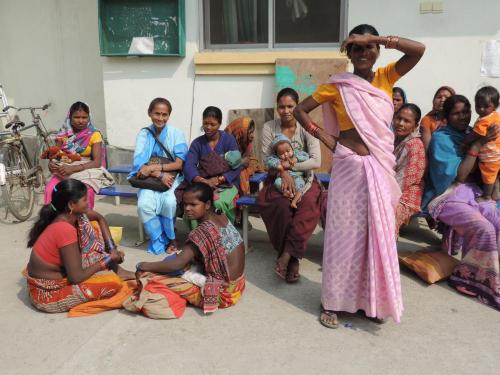
Partnerships are vital for community minded organisations to become sustainable. These might not lead to financial resources but they might introduce potential service users to an organisations creating greater patient flow, enabling greater technology to be used in the workplace, additional marketing efforts, etc. These partnerships might also create "good will" enhancing reputation leading to other opportunities, as well as, learning from one another, resulting in greater efficiencies and/or greater collaborations.
This was recently the case when Phul Kumari Mahato Memorial Hospital (PKMMH) hosted a four day DHO family planning program enabling approximately 62 women to receive a free government sponsored tubectomy. As a community based Hospital we welcomed this opportunity for the DHO to use the PKMMH infrastructure for the second year in a row. Although the treated women did not necessarily take advantage of the basic services offered at PKMMH, the fact that many had young children and that we are going to be hosting a pediatrician from Grande Hospital in Kathmandu in a few weeks was made known, as well as, introducing the women to what we do offer. Additionally we provided the DHO staff with some opportunities for piggybacking on PKMMH direct community marketing efforts at haat bazaars. Taking a more strategic business focused approach, for future programs it would make sense to plan early and develop further collaborations for greater impact as PKMMH has a great community base and DHO offers a variety of free services.
Recently Dr. Bhaskar Raj Pant an Orthopedic doctor at Grande Hospital in Kathmandu conducted a special clinic at PKMMH seeing approximately 110 patients over a day and half. He told me about the organisation Possible, http://possiblehealth.org/, of which he is a board member. "In everything we do, we believe in proving it’s possible to deliver high-quality, low-cost healthcare to the world’s poor. Healthcare is broken. It works the least for those who require it the most. And the worlds poorest need a new approach. We are a team determined to make a model of durable healthcare work where everyone said it couldn’t be done." (From Possible website)
Possible, with headquarters in New York City, operates a rural hospital in Achham providing, in partnership with the Government, subsidized health care in a very remote area and is constructing the first rural teaching hospital in Nepal. Their approach is one of integrated health, e.g. "What pregnant women really need, in a region with one of the highest maternal mortality rates in the world, is access to safe birthing centers closer to their homes and support throughout their pregnancies."
Possible's business model is one of, "high-quality, low-cost healthcare system that integrates government hospitals, clinics, community health workers, and referral care." Possible uses an entrepreneurial spirit, Key Performance Indicators (KPI), i.e. surgery access, equity, safe birth, follow up, outpatient use and family planning, and an approach that says, "In everything we do we believe in proving it's possible to deliver high quality, low cost health care to the world's poorest people." Possible is very strategic with 10 basic principles starting with putting their patients first, resulting in excellent customer care/service.
Possible understands the need to partner and does so with the Government through the Ministry of Health and Population and businesses such as Asana, Abbott, BambooHR, Google, QBC Diagnostics, Salesforce, Voith, covering a wide range of items helping to make their services possible.
Possessing an MBA and having been primarily focused on the social sector during my career, I very much appreciate taking a business with a human face approach. There is much to be learned from the corporate sector in terms of how to market services, partnering, customer/patient satisfaction, being strategic and using proper planning methods, etc. Taking a pro-active approach and ensuring that customer/patient/service users satisfaction is placed first is key to ensuring sustainability. The Possible business model shows that collaborations between the government, social and corporate sections can indeed make anything possible.










Add new comment